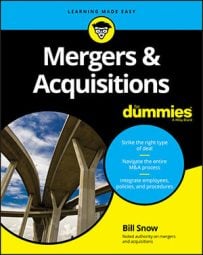Although the main cost in any M&A transaction is most likely the cost to acquire the company (or assets), both Buyers and Sellers incur other costs. These costs range from the retinue of advisors needed to close deals, paying off debt, adjustments made after the close, and, regrettably, taxes.
Advisors’ fees and other costs
M&A deal-makers can’t do the job alone. Any Buyer or Seller should retain a capital M&A advisor (investment banker), a lawyer, and an accountant. These people don’t work for free, so their charges are part of the expenses of doing a deal. Of course, advisor fees vary based on the deal and how much work the advisor does, but here are some very general guidelines:
A lawyer may charge anywhere from $25,000 to more than $100,000.
An accounting firm may charge anywhere from $25,000 to $75,000.
Investment banking fees vary, but in a very general sense, you should expect to pay roughly 3 percent to 10 percent of the transaction value.
Some deals involve other costs as well, including a real estate appraisal, an environmental testing, a database and IT examination, and a marketing analysis. Fees vary, of course, but all these functions likely cost anywhere from $10,000 to more than $100,000 apiece.
Nailing down the costs without knowing the deal is impossible. The best way to get a concrete estimate of a particular deal’s fees is to speak with advisors and ask them to ballpark their expenses.
If you’re worried about fees spiraling out of control, negotiate a flat fee, or a capped fee, from your advisors if possible. Not all will be willing to do this arrangement. If you get pushback, you can always agree that if the advisor does the work for a flat fee now, you’ll give him the ongoing legal or accounting work post-transaction.
Pay off debt
One of the areas that Sellers often overlook is the debt of the business. Unless stipulated, a Buyer doesn’t assume the debt. If a company has $5 million in long-term debt and the company is being sold for $20 million, the Seller needs to repay that debt, thus reducing the proceeds to $15 million.
Post-closing adjustments
Another area that Sellers often don’t think about is the adjustments made to the deal after closing. Most often this is in the form of a working capital adjustment, which occurs when the working capital (receivables and inventory minus payables) on the estimated balance sheet Seller provided at closing doesn’t match up with the actual balance sheet that the Buyer prepares at a later, agreed-upon date (usually 30 to 60 days after closing).
Buyer and Seller do a working capital adjustment to true up (reconcile) their accounts; this adjustment is typically (though not always) minor. If the actual working capital comes in lower than the estimate, Seller refunds a bit to Buyer (often by knocking some money off the purchase price). If the figure comes in higher than the estimate, Buyer cuts Seller a check.
Say Buyer agrees to pay $10 million for a business and that Buyer and Seller agree that working capital has averaged $2 million. If Seller’s estimated balance sheet shows working capital to be $1.5 million, Seller has to provide Buyer with $500,000. With a working capital adjustment, Buyer just pays Seller $9.5 million rather than $10 million.
Why take working capital adjustments? Simply put, working capital is an asset, and if less of that asset is delivered at closing, Buyer is due a discount from the agreed-upon purchase price (and vice versa). Without a working capital adjustment, Seller would have every incentive to collect all the receivables (even if done at deep discounts), sell off all the inventory, and stop paying bills, thus inflating payables.
Buyer would take possession of a business that has been severely hampered by the previous owner. Buyer then has to spend money to rebuild inventory and pay off the old bills and doesn’t have the benefit of receivables.
Capital gains taxes
Sellers often forget that they likely face capital gains tax on the business sale. That’s one reason Sellers generally prefer stock deals; a stock deal likely has a lower amount of tax. For many (but not all) Sellers, an asset deal exposes them to double taxation: The proceeds are taxed at the time of the sale at the company level, and then the owner pays again when the company transmits the proceeds to her.
Speak to your financial advisor about your specific tax situation.

